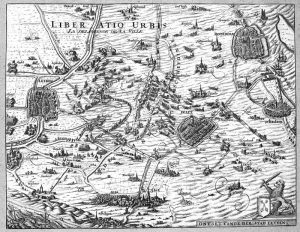
The relief of Leiden, 1574. Note the large area inundated for military purposes between Rotterdam and Leiden. Source: Wikimedia Commons
For centuries, the Dutch have fought against their arch-enemy: water. But, during the Dutch War of Independence in the 16th and 17th centuries, the Dutch found an ally in their arch enemy. Their struggle against Spain seemed almost hopeless because the rebels were facing the best trained, supplied and funded European army of that era. As the underdog, they turned to water and used it as a weapon against the Spanish by planning and carrying out a number military inundations, intentionally flooding enormous swaths of land to stop or even defeat the enemy.
However, it is possible that during the Dutch Wars of Independence the province of Holland could have been permanently flooded and lost to the North Sea. The Spanish, hurt by the military inundations, hatched a secret plan that aimed at defeating the Dutch by turning their watery ally against them. Luckily, this plan was never carried out. While Holland survived, the Dutch constructed a line of fortifications and waterworks to facilitate military inundations, which became known as the Dutch Water Line. This militarization of the Dutch landscape had profound long term political, social and environmental consequences for the province and the region.
Episode 77 of the Exploring Environmental History podcast explores these social, political and environmental issues with Robert Tiegs, Adjunct Professor at Sheridan College in Ontario, Canada.
Further reading and resources
Personal website Robert Tiegs. Contains an interactive inundation map and a brief history of inundations.
Robert Tiegs, “The Past Comes Flooding Back: The War That Almost Sank Holland”, NiCHE Canada, 13 April 2017.
Robert Tiegs, “Hidden beneath the waves: Commemorating and forgetting the military inundations during the Siege of Leiden.” Canadian Journal of Netherlandic Studies 35 (2014):1-27.
Robert Tiegs, “Adapting to Change: Simon Stevin’s Multifunctional Pivoted Sluice Lock and the Dutch Revolt.” Vulcan, 3 (2015):66-92.
Hollandse Waterlinie (in Dutch)
Music credits
“Fear and Hope” by reusenoise
“Our Lives” by @nop
“Death of a Music Box” by Hans Atom
All tracks available from ccMixter


July 2, 2017 at 7:06 am
Very interesting podcast and maps. I look forward to more of your work appearing in English.